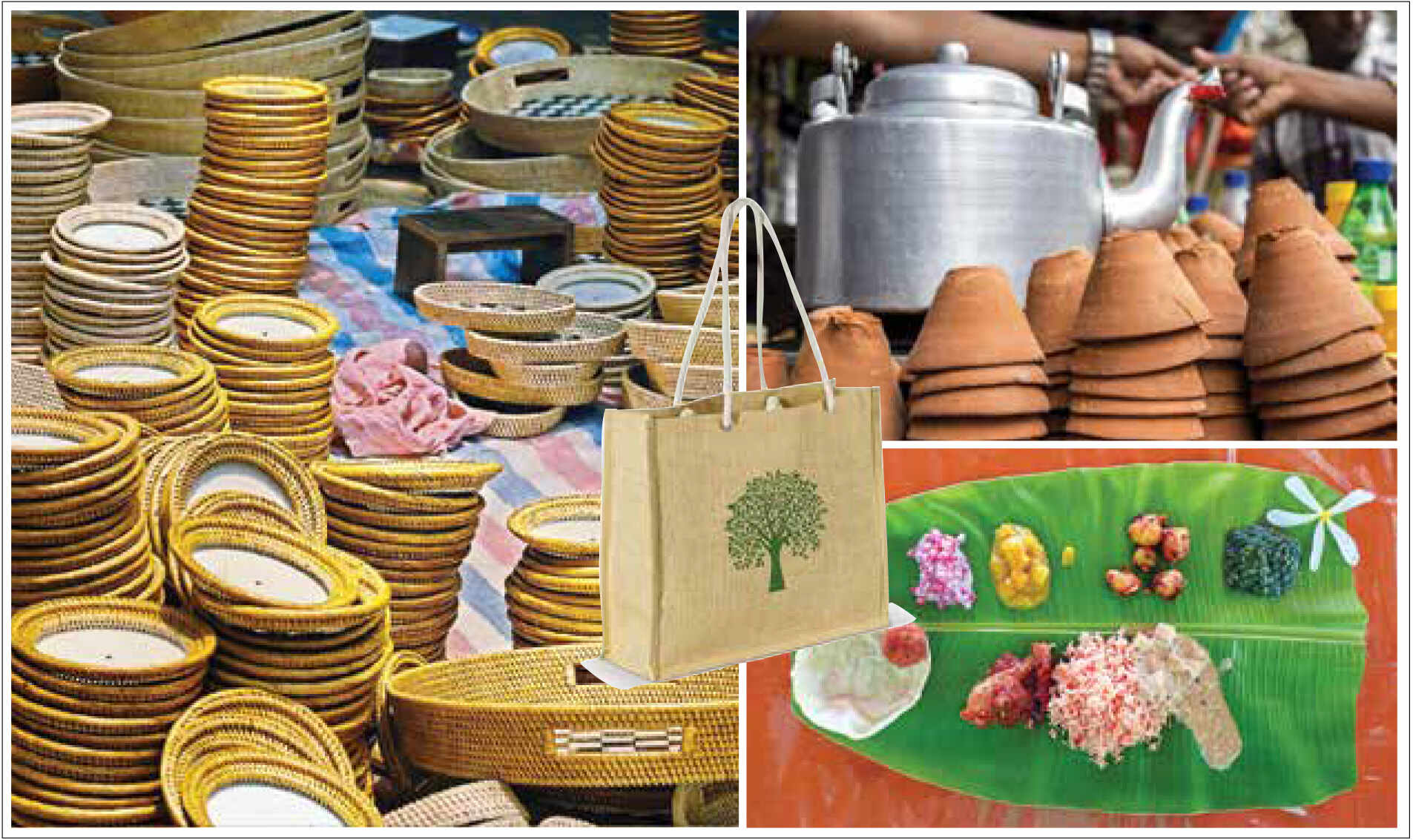Back to basics
Single-use plastic ban has offered an opportunity to curb pollution by resorting back to the use of traditional alternatives; write Pawan Sain & Akanksha Saini

Our current lifestyle choices need to undergo a transformation in order to materialise the combined vision of development and environmental conservation. To protect the environment, attention should be paid to environmentally responsible behaviour while also encouraging innovation. SDG 12 talks about a comprehensive set of actions for various stakeholders — from producers to consumers — for adapting to sustainable practices.
According to a UNEP report, every minute, an equivalent of one garbage truck of plastic is dumped into our ocean. Plastic pollution has developed into a persistent problem which is engulfing the entire planet. Everyone uses plastic in large quantities, oblivious of its effects on the environment. We are now addicted to single-use plastic items that have serious negative effects on the environment, society, and our health. According to a recent study by Un-Plastic Collective (UPC), India produces over 9.46 million tonnes of plastic garbage each year, of which 40 per cent is left uncollected and 43 per cent is utilised for packaging, primarily single-use plastic.
The Ministry of Environment, Forest and Climate Change issued a notification announcing a ban on selected single-use plastic items, effective from July 1, 2022. Single-use plastic constitutes the highest share of plastic manufactured. It refers to plastic items that are used once and discarded — like balloon sticks; polythene bags; cigarette packs; cutlery items including plates, cups, glasses, forks, spoons, knives, trays and earbuds sticks to name a few.
A systematic transition is required towards a sustainable, circular economy. The real problem with single-use plastics is how frequently we use them. Being environmentally friendly has gained popularity as a way of life that many people are now following. Although it might be fascinating to consider certain products like earthen pots and cups, banana and sal leaf plates, bamboo, jute/cloth bags etc. as fresh alternatives, these have been in use for decades in India. So, it would not be wrong to say that sometimes going backwards might give a solution to modern problems.
Earthen pots and cups are considered to be the best eco-friendly products that have lost the limelight in the present day and age due to cheap plastic bottles and cups. Drinking tea in kulhads has been a tradition for many centuries. It is considered that these kulhads have been in use for more than 5,000 years in India. Indian Railways has introduced kulhads to reduce the usage of plastic cups and also to help the potter community. Matka is used to store water, it helps in maintaining PH balance, keeps the water cool and has many other health benefits as well.
Vessels made up of bamboo — like plates, forks, bowls, spoons and baskets — are the most effective and proper replacement for plastic. Bamboo has tremendous untapped potential for transforming India's rural economy. These products are attracting significant market interest. More than five million people, half of them women in the tribal regions of India, earn their livelihoods from Bamboo production. India, being the world's second-largest cultivator of bamboo, has a huge scope for replacing the less sustainable products with bamboo products and creating green jobs in this sector as it will encourage traditional artisans. National Bamboo Mission (NBM), a step in this direction, focuses on the development of a complete value chain for the bamboo sector to link producers with consumers. The Kerala State Bamboo Corporation has tied up with Haritha Keralam Mission and Suchitwa mission to replace plastic stationery with bamboo products.
Serving food on leaf plates has been a long-standing tradition in India due to its own cultural, religious, medicinal, and socio-economic importance. Known by various names such as patravali, pattal, vistari, vistaraku, dona, these plates are made with leaves of sal, teak, jackfruit, lotus and banana trees in various shapes and sizes. These are biodegradable and can easily be disposed of. Leaves are used as a culinary tool as well as to wrap and cook food. They are easily accessible and add a special aroma and flavour to the food. Interestingly, a German company claimed to have invented leaf plates in 2016, which India has been using for centuries. Based on the Paris agreement on climate change, many restaurants in developed nations have started serving food to their customers on leaf plates. Cloth/jute bags and reusable paper bags, also known as thailas, can be an alternative to single-use polythene bags.
There are companies that are helping people to become more environmentally aware and adapt to a new lifestyle by completely eliminating the use of single-use plastic. The World Wide Fund for Nature-India and the Confederation of Indian Industry have teamed up to create a platform called 'India Plastic Pact' which aims to bring together Indian businesses to drive actionable, sustainable solutions and accelerate the transition toward a circular economy. Recently, the Ministry of Environment and Climate Change of Maharashtra joined the World Economic Forum's Global Plastic Action Partnership (GPAP) in the fight against plastic pollution and ensuring accountability and inclusivity throughout the value chain. We have to stop being a throw-away society and look at every opportunity to reduce, reuse, recycle and consider the impact of all our actions.
Pawan Sain is Joint Secretary, EAC-PM; and Akanksha Saini is Young Professional, EAC-PM. Views expressed are personal



